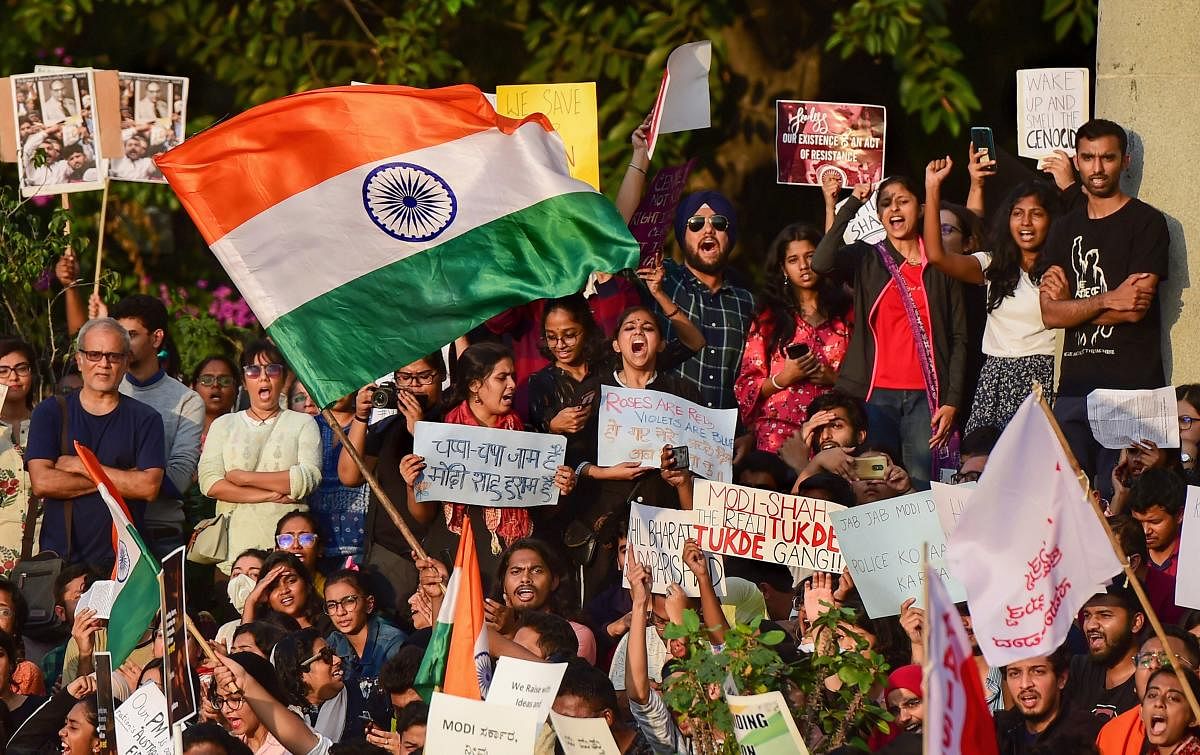
The cardinal principle in a functional democracy is the presence of a high level of tolerance to the dissent of its people by any government. India seems to be undergoing a testing time as far its tolerance to this vital feature of dissent over its policies, in recent times.
If democracy still holds good of its classic definition that it is ‘for the people, of the people and by the people’, then dissent by sections of people in the country has a legitimate role in the public affairs.
The ongoing developments in the country in recent times, particularly the attack of the JNU students by masked gangs within the university premises, for the protests the students have been carrying against CAA and other government policies, leaves one to wonder whether such minimum norms of tolerance in a vibrant democracy are getting eroded at an alarming pace.
As a first of its kind in the history of independent India, a serving chief of defence, the other day, made a direct comment on the political situation openly supporting the stand of the government.
What is more disturbing is the degeneration of the present dispensation in encouraging such highly placed governors, responsible individuals and institutions where neutral stand ought to be the order of the day, are made to toe the line of the government for short-term political gains.
A great deviation from the established norms in dealing with dissent in a democracy is the manner in which the officials of the National Investigation Agency (NIA) is made to function.
The way the residence and the office of Assam peasant leader Akhil Gogoi, who has been spearheading the anti-Citizenship Amendment Act (CAA) in the eastern Assam’s Jorhat region, were raided in Guwahati, is highly alarming.
What is more disturbing in the case of Gogoi is that he was charged with sedition under the Unlawful Activities Act, and the seizure of his personal effects including his bank documents.
It is disheartening to learn through the press the fact that activist couple Ektha Singh and Ravi Sekhar were arrested in Varanasi for their protests against CAA and put in detention leaving their months-old baby denied of breastfeeding, reflecting the insensitive attitude of the law enforcing agency. Sequestrating the family property for the individuals’ participation in the protest, as it is happening in Uttar Pradesh and in many other states, is only reflective of the medieval mindset of the government. It is reminiscent of the insensitive colonial practices in the country as well as the totalitarian fascist regimes in Germany and Italy in the inter-War period.
The manner in which the widespread student agitations all over the country are being meted out is still another pointer.
The Aligarh police have lodged FIR against as many as 1,200 students in one go for taking out candlelight march against CAA to show solidarity with the students who faced police action in the University and in Jamia Millia Islamia.
Protest march
This raises the question of whether the students are denied the right to protest peacefully even within the campuses, on issues of national importance.
Similar arrests were carried out against students of BHU and Mahatma Gandhi Kasi Vidyapeeth for taking out a protest march, on charges of “rioting, unlawful assembly, disobedience and assault” among other charges.
The incident involving Kerala Governor Arif Khan at the inauguration of the 80th annual session of the Indian History Congress (IHC) at Kannur on December 28 when he openly sided with the Union government over the issue of the ongoing agitation against CAA, is an indication of how the minimum democratic norms are being destroyed by people holding constitutional positions.
The proposal of the present government to update the National Population Register (NPR) to verify details through the house to house remuneration with data such as parents’ place of birth to be gathered, coupled with the passage of CAA which excludes few select minorities, has brought people on to the streets in protest. More than 20 people have been so far killed during these protests.
Several religious leaders and seers, denoting their sectarian affiliations, have become chief ministers and members in state and Central legislatures making the political narrative of the government to openly move away from the normative values of secularism as envisaged in the Constitution of the country.
This trend of the government harbouring and encouraging only the yes men and decimating any form of dissent will not augur well for the continuation of democratic norms in the long run. It will only erode the largely held feeling that democracy is the best form of government that the human mind has ever achieved.
(The writer is former Professor of History, University of Hyderabad)